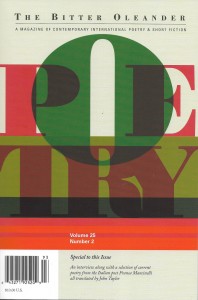Franca Mancinelli / The Bitter Oleander
- Post By: johntaylor
- Date:
- Category: Actualités
Un dossier sur la poétesse italienne Franca Mancinelli dans la revue américaine The Bitter Oleander (automne 2019), avec un dialogue entre la poétesse et son traducteur John Taylor. Un extrait:
. . . JT: Passing through. . . Your collection of prose poems, Libretto di transito,
became The Little Book of Passage in my translation. While I was working
on your prose poems, the word “faglia” resisted translation. It is related to what
you have been saying about the presence of death in life. There were a few solutions
for translating it, each of which had its advantages and disadvantages: “flaw,” “rift,”
“fault,” “fault line.” You and I often discuss the semantic resonance of such Italian
words, but “faglia” stands out as a key term. The word, the image, and the theme
have left their marks on both of us. For the line in your prose poem, we opted for
“fault line,” with its geological meaning, all the more so in that other images in your
poems and prose poems likewise suggest “cracks,” “breaks,” “fissures,” and “fractures.”
How do the various metaphorical “fault lines”, “fissures” and “fractures” in your
work reveal something especially profound about your poetics—its sources, its
goals, its intentions?
FM: Thanks to your translation, I could see the importance that this image
has for me. When we write, we are often immersed in darkness, like a photographer
in his darkroom. It is only with time that what has been imprinted on
our film resurfaces. Most words thus pass through us without our really being
aware of the range of their meaning. Sometimes it is another person’s insight
that brings it nearer. This is what happened with this word that reached me
through our close working relationship, and through the magical force that
results from paying attention, as Pavel Florensky put it. The word we initially
stopped to talk about was “falda,” the “water table.” It’s the last word of an
important text for me: it comprises, like a diptych, my father’s portrait next to
my involuntary self-portrait. While he is off in a corner of his garden, watering,
I find myself with poisonous weeds that I cannot “hoe away.” They are fed by
a water table that “I can’t repair.” Although I devote my entire self to the task,
I obtain nothing but a sense of failure. I wrote the word “falda” with my eyes
kept tenaciously closed, and so they remained even after I had published the
poem in an anthology and had read it several times in public, even after I
had worked on Libretto di transito with the editors of Amos Edizioni and
had published the book in Italy. Yet the gap that separates our two languages
and that we had to fill in some way has repaired that water table, in the only
possible way: allowing me to see it in its reality. The water table is the origin
of pain, of relationships that resemble poisonous weeds. But it is irreparable
(it is in the earth); it is where the water comes from, life, in whatever form
it appears. Perhaps pain comes precisely from the desire to repair what can,
instead, only be accepted. . . Now I read that sentence with a different tone
of voice. Something has been redeemed: “I haven’t succeeded in repairing
the water table.”

Laisser un commentaire